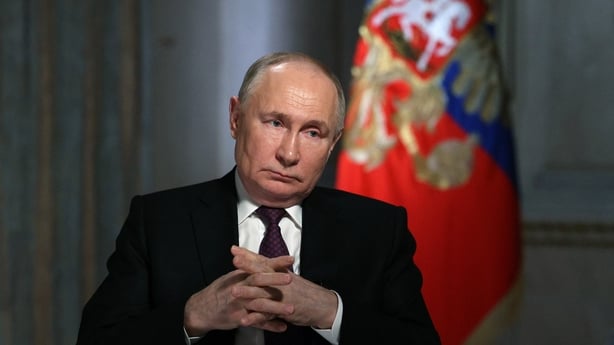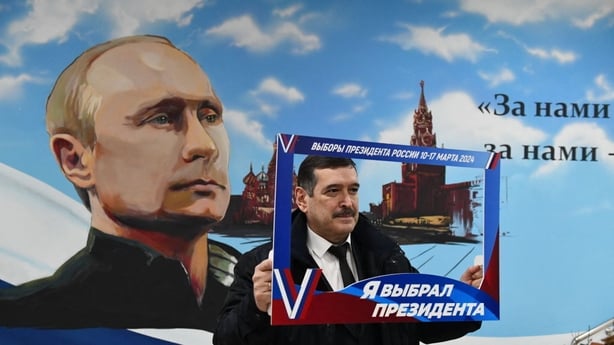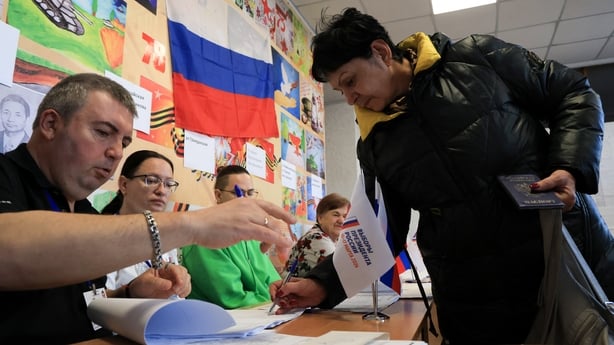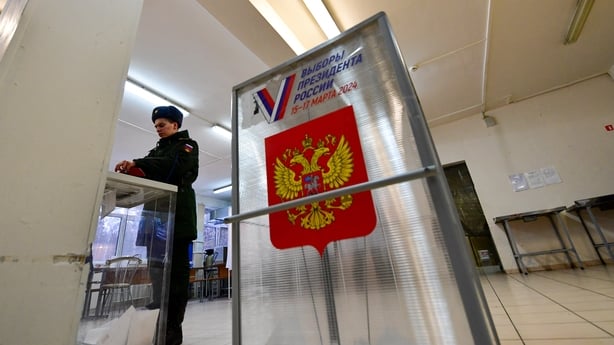Russia's election has been marred by a series of disruptions including dye being poured into ballot boxes, a Molotov cocktail thrown at a polling station in President Vladimir Putin's hometown, and reported cyberattacks.
Millions of Russians cast their ballots across the country's 11 time zones at the start of a three-day election that is almost certain to hand Mr Putin six more years at the helm of the world's largest country by territory.
Amid the Ukraine war, the deadliest conflict in Europe since World War II, Mr Putin, 71, dominates Russia's political landscape and none of the other three candidates on the ballot paper presents any credible challenge.
Dye was poured into ballot boxes in Moscow, Russian-annexed Crimea, and the Caucasus region of Karachayevo-Cherkessia, according to Russian media, in apparent anti-Kremlin protests.
CCTV footage of one dye-pouring incident showed a young woman depositing her voting slip before calmly pouring a green liquid into the ballot box.
A policeman was seen detaining her immediately afterwards.
A Molotov cocktail was thrown at a polling station in St Petersburg, and a 21-year-old woman arrested, the Fontanka news site reported.

Arson attempts were recorded at polling stations in Moscow and Siberia.
Russia's electoral commission chief Ella Pamfilova said perpetrators of such acts faced up to five years in prison, and suggested they had been paid for by those seeking to disrupt the vote.
"Listen carefully everyone," Ms Pamfilova said, before setting out the article in the criminal code which dealt with disrupting the work of electoral commissions.
"Especially for all the scumbags who are prepared to destroy the votes of the people because of these pieces of silver," Ms Pamfilova was quoted as saying by the TASS state news agency.
As of 5.20pm Moscow time (2.20pm Irish time), country-wide turnout was high, at around 24.6%. Demand for electronic voting was so high the system was overloaded.
The Kremlin says Mr Putin, in power as president or prime minister since the last day of 1999, will win as he commands broad support for rescuing Russia from post-Soviet chaos and standing up to what it says is an arrogant, hostile West.
The shadow of the Ukraine conflict hangs over the election: Russia has several hundred thousand troops fighting a grinding artillery and drone war along the 1,000km front line in Ukraine.
Russia's defence ministry said Ukrainian proxies had repeatedly tried to pierce Russia's border over the past three days, but had been repelled.
At least three children were killed by Ukrainian shelling of the Russian-controlled city of Donetsk, the mayor said.
There was repeated shelling of the Russian region of Belgorod where two people died and 23 were injured.

Mr Putin accused Ukraine of aiming to disrupt voting by trying to frighten people and said its actions would not go unpunished.
The Kremlin has repeatedly warned that any attempt to interfere in the election would be considered an act of aggression.
Russia's foreign intelligence service said the US was planning to meddle.
The electoral commission said there had been more than 10,000 attacks on electronic voting systems but that they had endured.
One woman scrawled "return me my husband" on her ballot paper before burning it, according to videos on social media.
A spokesperson for disqualified presidential candidate Boris Nadezhdin said two staffers and one volunteer associated with his campaign were detained today and another activist attacked at a polling station.
More than 114 million Russians are eligible to vote, including in what Moscow calls its "new territories" - four regions of Ukraine that its forces only partly control, but which it has claimed as part of Russia. Ukraine says the staging of elections there is illegal and void.
EU chief Charles Michel sarcastically congratulated Mr Putin on winning re-election against no real opposition.
"Would like to congratulate Vladimir Putin on his landslide victory in the elections starting today," Mr Michel wrote on X.
"No opposition. No freedom. No choice."
Would like to congratulate Vladimir Putin on his landslide victory in the elections starting today.
— Charles Michel (@CharlesMichel) March 15, 2024
No opposition.
No freedom.
No choice.
Mr Putin ordered a full-scale invasion of Ukraine in February 2022 after eight years of conflict in eastern Ukraine between Kyiv's forces on one side and pro-Russian Ukrainians and Russian proxies on the other.
If Mr Putin completes a new six-year term, he will overtake Soviet dictator Josef Stalin to become Russia's longest-serving ruler since Empress Catherine the Great in the 18th century.
The West views Mr Putin as an autocrat, a war criminal, a killer who US officials say has enslaved Russia in a corrupt dictatorship that is driving it to strategic ruin.

But in Russia the war has helped Mr Putin tighten his grip on power and boost his popularity with Russians, according to polls and interviews with senior Russian sources.
Russia's best known opposition politician, Alexei Navalny, died suddenly in an Arctic penal colony last month and other Kremlin critics are exiled or in jail.
The opposition says the vote is a sham and have called on people across Russia to protest by turning out to vote all at the same time at noon on Sunday in each of the country's 11 time zones.
Mr Putin is running against Communist Nikolai Kharitonov, Leonid Slutsky, leader of the nationalist Liberal Democratic Party, and Vladislav Davankov of the New People party. Two anti-war candidates, Boris Nadezhdin and Yekaterina Duntsova, were barred from running by the electoral commission, which cited irregularities in their paperwork.

Mr Navalny's widow and supporters have called on people across Russia to protest by turning out to vote all at the same time at noon on Sunday in each of the country's 11 time zones.
They have presented the "Noon Against Putin" action as a way for people to express opposition without the risk of arrest, as they will be queuing up to vote legally. The Kremlin has warned people against taking part in unauthorised gatherings.
Under constitutional changes that voters approved in 2020, Mr Putin will be eligible to run for yet another term in 2030, potentially extending his rule to 2036.

